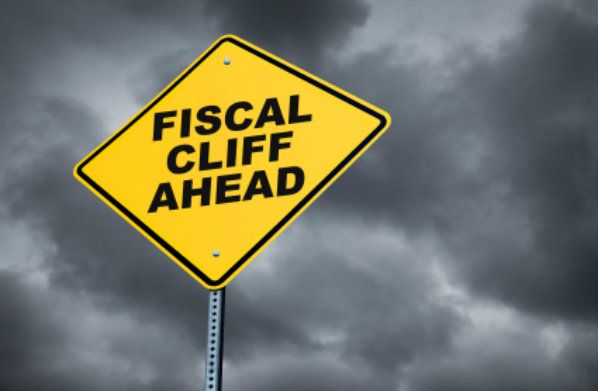George Will has finally explained exactly what the so-called fiscal cliff is:
With a chip on his shoulder larger than his margin of victory, Barack Obama is approaching his second term by replicating the mistake of his first. Then his overreaching involved health care — expanding the entitlement state at the expense of economic growth.
Now he seeks another surge of statism, enlarging the portion of gross domestic product grasped by government and dispensed by politics. The occasion is the misnamed “fiscal cliff,” the proper name for which is: the Democratic Party’s agenda.
Preventing us from going over this metaphorical cliff is going to require us to shrink government, thereby cutting spending, and to allow citizens to keep more of their money to spend it productively (or take the hit themselves if they use it badly). But Democrats can't do this for deep-seated reasons. At the very least, they want to restore Clinton-era tax rates, which, as Will points out, would be disastrous in an Obama-era economy.
It is distressing in the extreme—but hardly surprising, given the above—that as we approach the abyss, all the president can talk about is raising taxes on top earners. Republicans estimate that the president’s plan would bring in enough new revenue to run the government for fewer than nine days. But that is the only thing POTUS seems to be interested in as the crisis builds.
Erskine Bowles, coauthor of the report from the president’s debt commission, believes we will go over the cliff:
To do so would be "insane," Bowles said. However, he forecast only a one-third probability that Obama and a divided Congress can agree on a budget deal that raises revenues and cuts spending. "One without the other won't work," he said.
Republicans have made overtures towards compromise; Democrats have not. To do so would be to go back on a political activism that they embraced in the 1930s, shoved forward in the 1960s, and put on steroids with the election of President Obama.
Meanwhile, Will explains something intriguing: Why did Democrats become so unhinged by Paul Ryan’s health insurance proposals? After all, Ryan’s voucher system would provide subsidy for low-income people and introduce means testing, which would add to the system's progressivity—two things Democrats should like. Here is why they don’t like it:
Liberals’ strenuous objection to vouchers is that vouchers, as the functional equivalent of cash, empower individuals to make choices. It is the business of the liberals’ administrative state, staffed by experts, to make choices for inexpert individuals. This is why, while Democrats in Washington are working to reduce the portion of Americans’ private income that is disposed of by private choices, two tentacles of the Democratic Party — the Indiana and Louisiana teachers unions — are in their states’ courts waging futile fights against school choice programs, lest thousands of low- and moderate-income parents be as empowered as millions of demobilized servicemen were.
We’re looking at what is happening on Capitol Hill as a severe but nevertheless within the realm of the ordinary clash of the two parties. Their leaders find time to talk on TV day and night, whether they are talking to each other or not. But the endless palaver may be a symptom of the root problem: there's not much else to do but talk; the Democrats can't give in, though disaster looms. But this is not an ordinary clash. This debate is, as as Will puts it, about “the nature of the American regime.” To stave off a catastrophe, the Democrats would have to sacrifice their convictions.
In this struggle, the oft-vilified House Republicans have just as much of a mandate at the president:
When the Republican House majority acts as though it has a mind — and a mandate — of its own, this is not Washington being “dysfunctional,” it is the separation of powers functioning as the Founders intended. Their system requires concurrent congressional majorities — one in the Senate, with its unique constituencies and electoral rhythms, another in the House, with its constituencies and rhythms. And at least 219 of the 234 House Republicans won in November by margins larger than Obama’s national margin.
I don't want to be a squish, but I it's obvious that the House Republicans are trying harder to solve the problem than the Democrats. On the other hand, remedying the situation would not require of them a repudiation of their party's political philosophy.


